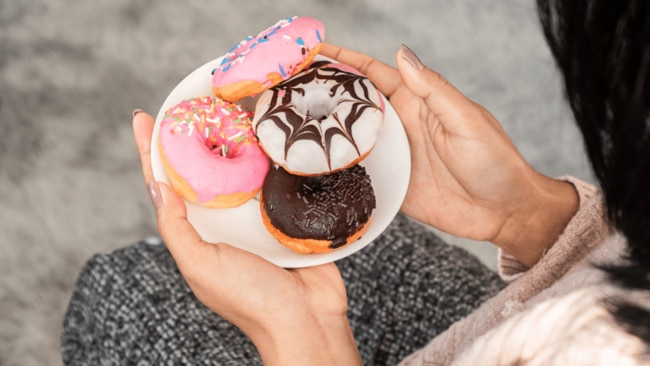How to feel in control around food (and stop bingeing on chocolate)
It has nothing to do with willpower

If you actively avoid having certain foods in the house for fear of bingeing on them, nutritionist and dietitian Lyndi Cohen says you should actually incorporate them into your diet more, not less.
Do you feel like food controls you, instead of the other way around? If you’ve ever felt like you can’t buy certain foods (chocolate - I’m looking at you!) because, once they’re in the house, you won’t be able to stop yourself inhaling them faster than you can hide them from yourself, this is a red flag.
It’s time to reclaim control over your food, and stop bingeing on these 'trigger foods' you’ve probably attempted to cut out of your diet and your life, too many times to count.
Food shouldn’t take up all of your brain power and your time. What if I told you you can learn to enjoy food - even your favourite, binge-able foods - with balance? You can learn to trust yourself around food, so you can buy a block of chocolate and feel safe knowing you don’t need to scarf it down in one sitting. You can learn to make positive choices around food and become a ‘few squares at a time’ kinda person.
Like what you see? Sign up to our bodyandsoul.com.au newsletter for more stories like this.
Here’s how to feel more in control around food, and stop bingeing on chocolate, carbs, lollies - whatever it may be for you (I’m guessing you have one or two foods coming to mind immediately).
Identify sneaky diet rules
Are there certain foods you avoid, or don’t allow yourself to eat? Maybe you’re afraid of them, or maybe you’ve convinced yourself you 'don’t like them'?
You might notice you really want to order certain dishes off a menu at a restaurant, but you always choose another ‘healthier’ option. You might even claim you’re intolerant to certain foods (like dairy or gluten) so you have an easy excuse to avoid eating them around others.
Common diet rules include not being allowed to eat food groups like sugars, fats or carbohydrates, or even specific foods like pasta, pizza, chocolate or ice cream. Diet rules can even exist around the timings or contexts in which you’re allowed to eat some foods - for example waiting to a certain time until you’re allowed to eat, or only eating treat foods on specific days of the week. If you can’t think of any, consider the foods you find yourself overeating or bingeing on. These often have some lingering diet rules tied to them.
Chances are the foods you feel most out of control with are the same foods with most niggly diet rules.

Figure out if you have any lingering rules around foods you can and can’t eat, or foods you consider 'healthy' and 'unhealthy' or 'good' and 'bad'. Once you’ve identified these, it’s time to unpack and unlearn them. Any kind of sneaky food rules that still exist and impact your food choices make you much more likely to feel out of control around food and lead to bingeing or overeating.
That’s because, once you tell yourself you can’t eat a food, you almost immediately crave it and want it so much more. It’s a biological response - and one you can’t control.
Whatever is 'forbidden' from your diet is suddenly held up as this elevated, aspirational food - one you’re only allowed under very strict circumstances. So, in the event that you do allow yourself to eat that food, you don’t know when the next time you’ll be 'allowed' to eat it is. This means, that instead of eating it slowly and savouring it, you’re probably going to want to inhale as much of it as possible, like a crazed squirrel hiding in the pantry.
And before you know it, the entire family-sized block of Cadbury is long gone… We’ve all been there!
Whereas if you allow yourself to eat all foods, with no limits or restrictions, you learn that you can eat chocolate (or whatever food you commonly binge on) whenever you truly want some. This means, instead of having to cram the whole block down in one sitting, you can have a little bit now, and come back for more later if you want. Suddenly, the pressure to binge or overeat is lessened, and the chocolate becomes just like any other food: neutral. Not good, not bad. Just food. You have control over the chocolate once again.
Eat more to eat less
This one might sound shocking, but hear me out. Many people binge in the afternoon or evening because they haven’t eaten enough throughout the day. Or because they’ve tried to be 'good' all day long, avoiding snacking, eating small portions, or limiting the number of calories they eat, only to go ham at the end of a long day, no longer in control of their hunger level or their food choices.
Fact: your body needs a certain amount of energy (or calories) every day to keep you alive and functioning well. To keep your heart pumping, your digestive system working, and your mood stable (no one wants to deal with you when you’re hangry, let’s be honest). And if you’re not providing it with enough energy throughout the day, your hunger levels will increase to drive you to eat more - to ensure it does get the energy it needs, whatever it takes.
Remember this: If you undereat, your body will make up for it - with, or without you.

That means, if you need to inhale that block of chocolate to give your body the energy it’s crying out for, that’s what your body will encourage you to do. And this is often where you lose control around food.
Instead of trying to 'save' calories throughout the day, or eat as little as you can in preparation for a binge session in the evening, try to eat more during the day. Make sure each of your meals is satisfying and balanced. Be sure to include a source of slow-burning carbs, healthy fat and protein at breakfast, lunch and dinner. This will help you rely less on snacking, and no longer resort to binge episodes to get the energy you need during the day.
Eat intentionally, not impulsively
Instead of eating impulsively, like you probably do when it comes to your binge foods, try to eat more intentionally. I’m permitting you to include the foods you tend to binge on - yes, chocolate included! - in your diet regularly, but I want you to change how you eat them.
Instead of unwrapping the block of chocolate, only to blink and find it gone seconds later, make it an enjoyable event whenever you choose to eat some. Serve yourself a portion on a plate, and fill the rest of that plate with some more satisfying foods - whether that’s some protein, healthy fat, and carbohydrates, to make it a more filling eating occasion.
Then, once your plate is ready, eat it slowly and mindfully, away from all distractions. Yes, that does involve turning off Bridgerton - even if you’re midway through a steamy scene. Eat away from all screens, so you can truly focus on and appreciate your food.
This will make you much less likely to overeat. If you still want more chocolate after you’ve finished your plate, you’ll be more in control of that decision, and able to serve yourself another reasonable portion - instead of polishing off the entire packet. Plus, you’ll actually enjoy the experience of eating it much more, as you’ll be savouring the taste rather than cramming as much into your gob as you can.
Lyndi Cohen is a dietitian and best-selling author and is known for calling out nutrition nonsense, challenging diet culture and promoting healthy body image. You can follow her on Instagram here, visit her here, or download her Back to Basics app.




